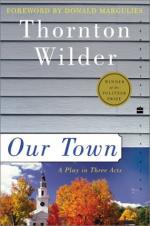|
This section contains 474 words (approx. 2 pages at 300 words per page) |

|
Wilder is obsessed with the notion of communality and identity of little people everywhere, but most particularly in middle America. They form, for him, a fictive we, the source and culmination of all that is enduring and wonderful about humanity, and most of Wilder's dramaturgy consists of brandishing this great, shaggy, unwashed lowest common denominator of a we as the tool, subject, and end product of playwriting. But lowest common denominators are too low and common for art: even Whitman, that other grassroots American, was saved by the rough idiosyncrasy of his I; Wilder sinks into the treacly morass of his we.
Philosophically, dramatically, and literarily I find The Skin of Our Teeth unpalatable. There is, first, the (all too or not enough) Joycean double or triple exposure of seeing the Antrobus family of Excelsior, N.J., as the prehistoric family—both the Biblical first family and early...
|
This section contains 474 words (approx. 2 pages at 300 words per page) |

|


